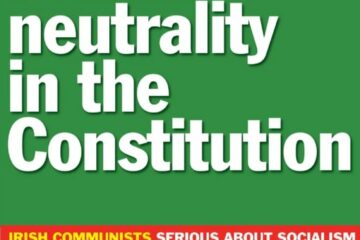The decision of the Democratic Unionist Party to collapse the Stormont Executive should not come as a surprise. The DUP have a dual strategy: firstly, to show themselves as continued useful servants to the British and, secondly, to unify the DUP and squeeze the UUP and the TUV in order to remain the largest party in the Stormont Assembly.
The action of pulling out of the Executive has been sanctioned by the British state. What is in it for the DUP and the British? The British state is using its border in Ireland, and its continued interference in the affairs of the Irish people, to advance its strategic negotiations with the European Union. The Protocol and the political divisions within the Six Counties are the instruments the British have chosen to use as leverage in those negotiations.
These negotiations have been going on for some time, with both the British and the EU determined to defend and advance their own strategic interests. The pressure is on the EU to defend its cornerstone policy of a single internal market, and on the British to gain maximum access to that single market with minimum disruption for capital. As experience has shown over many decades, the British are more than willing to use and exploit political and sectarian divisions nurtured by them to advance their own political and economic strategic aims, both in Ireland and globally.
Unionism has always been the agent adopted by the British for playing the sectarian card, and the DUP are more than willing to use sectarianism to advance their goal. Donaldson gives priority to it so as to find unity within the DUP and to capitalise on the weakness of the UUP and continue to be the largest party of unionism. The DUP strategy is to hit the agricultural base of the UUP with the proposed legislation on carbon reduction, to squeeze the maximum support out of the UUP’s voter base, and to minimise the support going to the Alliance Party from that source, to show that they are the only party capable of defending the “union” and protecting the interests of the unionist farming sector.
This strategy is geared to securing its electoral strength in the forthcoming Assembly election on the 5th of May.
It is clear that there can be no democratic internal settlement with political structures created by and dependent upon British imperialism. The internal structures are for reinforcing divisions, not overcoming them; they are for the assimilation of former and potential radical forces into managing a situation that suits the British and their interests.
Britain is not a disinterested party but rather is central in maintaining and using sectarianism as a weapon. No democratic internal settlement is possible.










